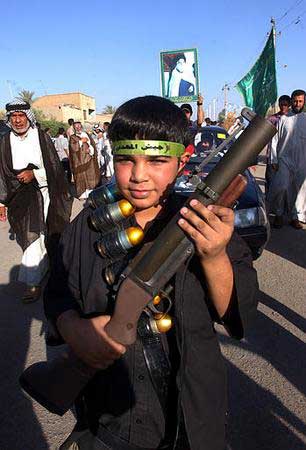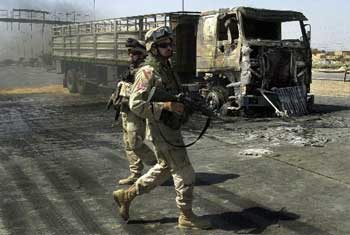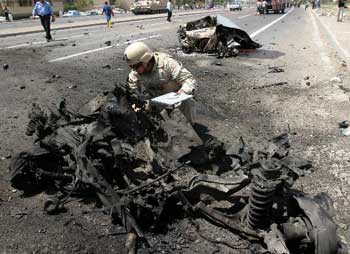|
 WASHINGTON
- The latest Army investigation into the Abu Ghraib scandal
is raising new questions about whether the CIA, operating
outside military rules, contributed to the breakdown of
military discipline at the prison. WASHINGTON
- The latest Army investigation into the Abu Ghraib scandal
is raising new questions about whether the CIA, operating
outside military rules, contributed to the breakdown of
military discipline at the prison.
The report cites the presence of unregistered
"ghost detainees" who did not fall under the
military's usual system of registration, interrogation
and medical care.
But the CIA is rejecting much of the criticism.
Spokesman Mark Mansfield said recently that the report,
released last week, "makes broad allegations about
the CIA that are not supported by the text."
The report by senior Army generals describes
some of the CIA's detention procedures, shining a rare
light on those practices. Yet it does little to describe
the spy agency's actual interrogation methods at Abu Ghraib,
beyond saying they contributed to the discipline problems.
"The CIA's detention and interrogation
practices contributed to a loss of accountability and
abuse at Abu Ghraib," says the investigation report.
Of 44 incidents of possible abuse cited
in the Army's intelligence investigation, the CIA was
involved in only one - the only one to involve the death
of a detainee. In that case, a newly arrived CIA prisoner
did not receive the initial medical screening typical
for incoming detainees, and then died. That death remains
under investigation.
To date, none of the abuses depicted in
the infamous photographs from Abu Ghraib have been found
to involve CIA personnel, Mansfield said.
 The
specific allegations of abuse at various U.S.-run detention
and interrogation centers in Iraq and Afghanistan are
being investigated by the CIA's Inspector General. In
several cases, the Justice Department is also investigating
whether any CIA officers or contractors committed criminal
acts. The
specific allegations of abuse at various U.S.-run detention
and interrogation centers in Iraq and Afghanistan are
being investigated by the CIA's Inspector General. In
several cases, the Justice Department is also investigating
whether any CIA officers or contractors committed criminal
acts.
The arrangements to hold "ghost detainees"
were made between local CIA officers and military officials
at the prison, the investigation found. Army investigators
said they located information on eight "ghost detainees"
held at Abu Ghraib, but said there may have been more.
In one case, military guards at the prison
moved a group of detainees around the prison to hide them
from a visiting Red Cross delegation, according to the
report of U.S. Army Maj. Gen. Antonio Taguba, who conducted
a separate investigation into the prison's military police
unit. He described the actions as "deceptive, contrary
to Army Doctrine, and in violation of international law."
A U.S. intelligence official, discussing
agency operations on the condition of anonymity, said
the CIA would keep detainees hidden to prevent insurgents
both inside and outside the prison from learning of their
capture, suggesting the agency believed that Red Cross
knowledge of a given prisoner could ultimately reach insurgents.
If the prisoners had been put in the general
prison population, they might have been able to confer
with associates and plan their responses for an interrogation,
the official said. The official said there were only a
"handful" of such secret prisoners.
 The
Army investigation suggested that one prisoner who died
did not receive a proper medical screening because the
CIA officers who brought him to the prison ignored the
usual registration procedures. The
Army investigation suggested that one prisoner who died
did not receive a proper medical screening because the
CIA officers who brought him to the prison ignored the
usual registration procedures.
In that case on Nov. 4, 2003, a Navy SEAL
team captured Manadel Al-Jamadi, who was thought to have
been connected to an attack on the International Committee
of the Red Cross. In detaining him, a SEAL subdued him
by hitting him on the side of the head with a gun butt.
Two CIA personnel brought Al-Jamadi to Abu Ghraib and
put him in a shower room.
The prisoner was dead 45 minutes later.
An autopsy determined Al-Jamadi died of a blood clot in
his head that was probably the result of being struck
with the gun.
A day later, U.S. personnel sneaked the
body out on a stretcher, disguised so the dead person
would only look sick to other inmates.
"It is unclear how and under what
authority the CIA could place prisoners like (this detainee)
in Abu Ghraib," because no formal agreement between
the agency and the military existed, the report says.
Had the prisoner been processed like a
normal Army prisoner, he would have received at a minimum
a medical screening, the report says.
Mansfield said the CIA does not take issue
with the Army report's conclusion that there was confusion
in the military regarding the CIA's role and authority
at the prison.
Agency officials agree that better coordination
and written agreements between the military and CIA would
have clarified some matters, particularly for the soldiers,
he said.
The Army report describes Lt. Col. Stephen
Jordan, the head of the interrogation center at Abu Ghraib,
as "fascinated" with the CIA, and says he gave
agency personnel leeway to operate without military involvement.
The CIA's freedom to operate influenced
Army soldiers to ignore military procedures, the report
contends.
The Army generals said it is possible
that still other agencies were involved in handling prisoners,
but that most of the information about non-military operators
in the report referred to the CIA.
Other groups could have included the FBI;
the Task Force 121, the special operations-CIA unit hunting
senior Iraqi leaders; and the Iraqi Survey Group, the
CIA-Defense Intelligence Agency operation that hunted
for weapons of mass destruction.
|